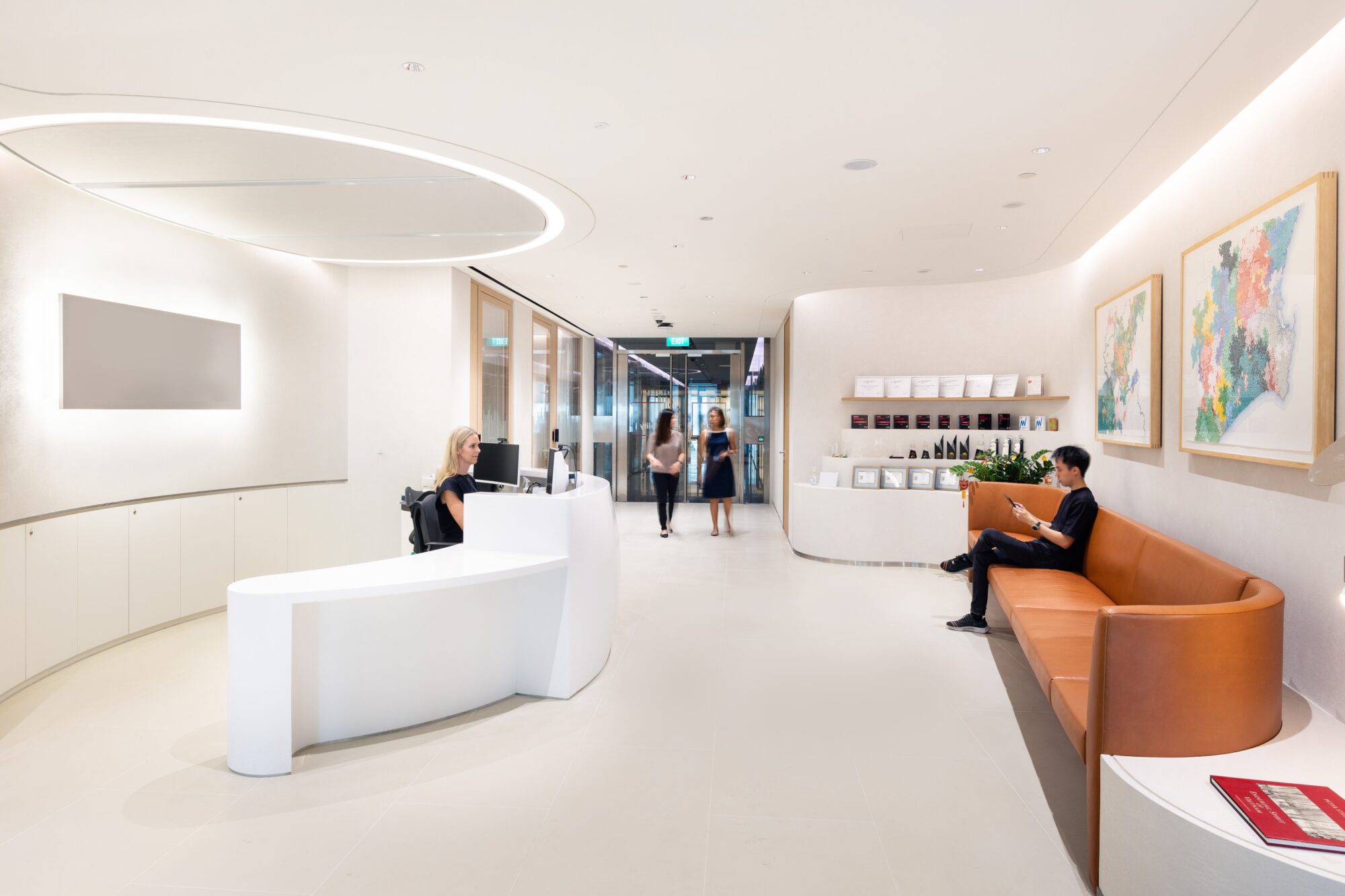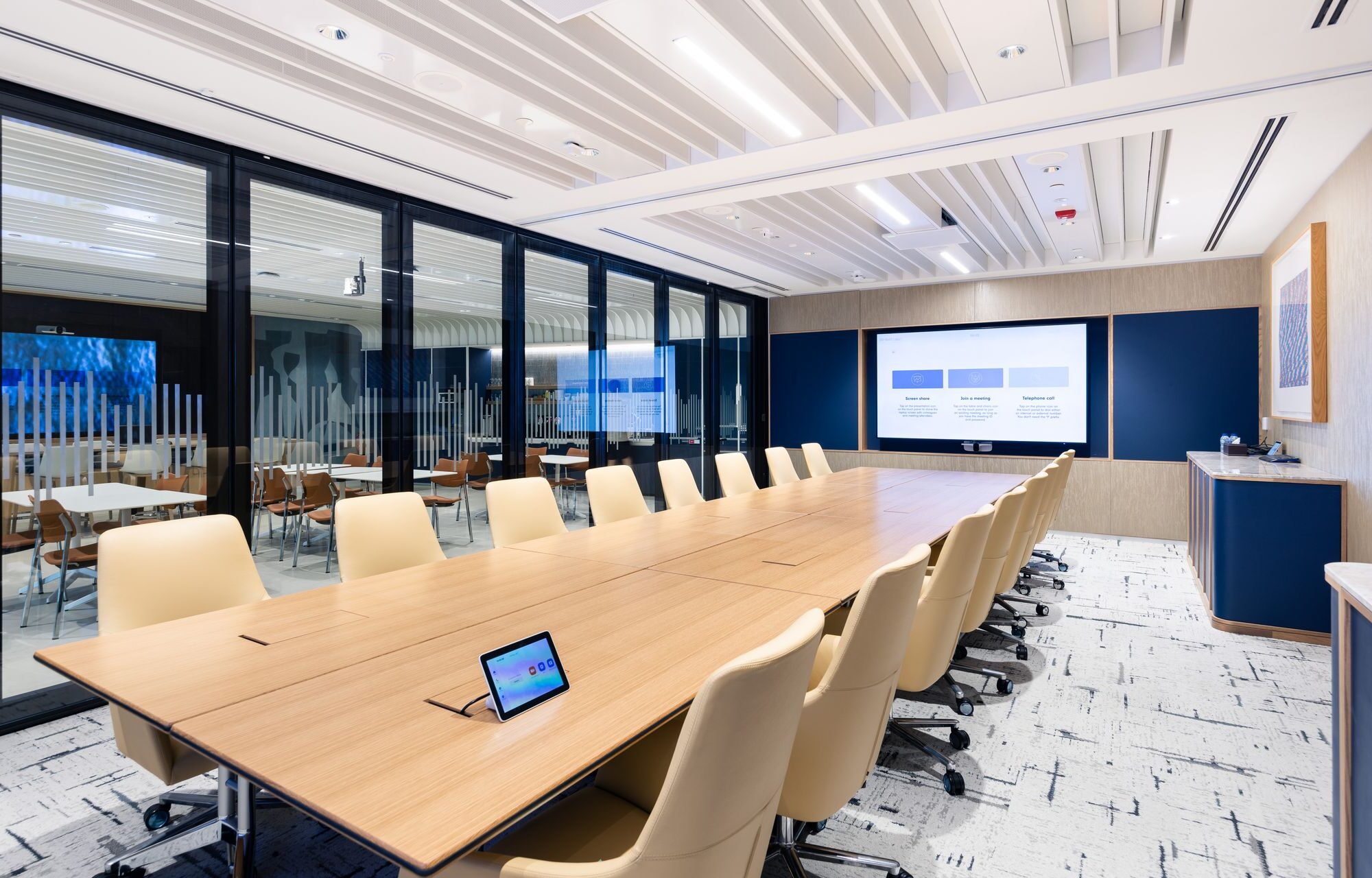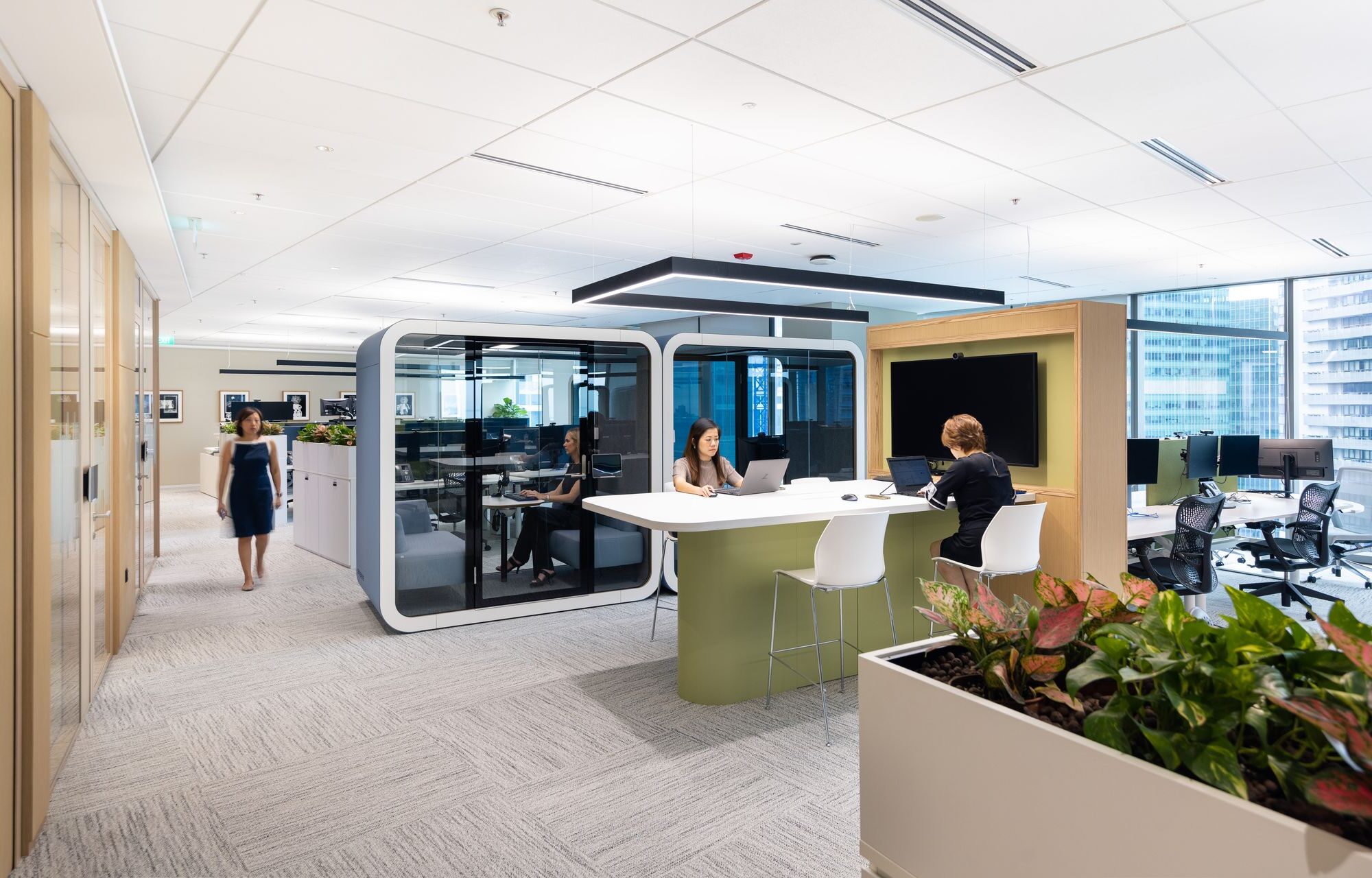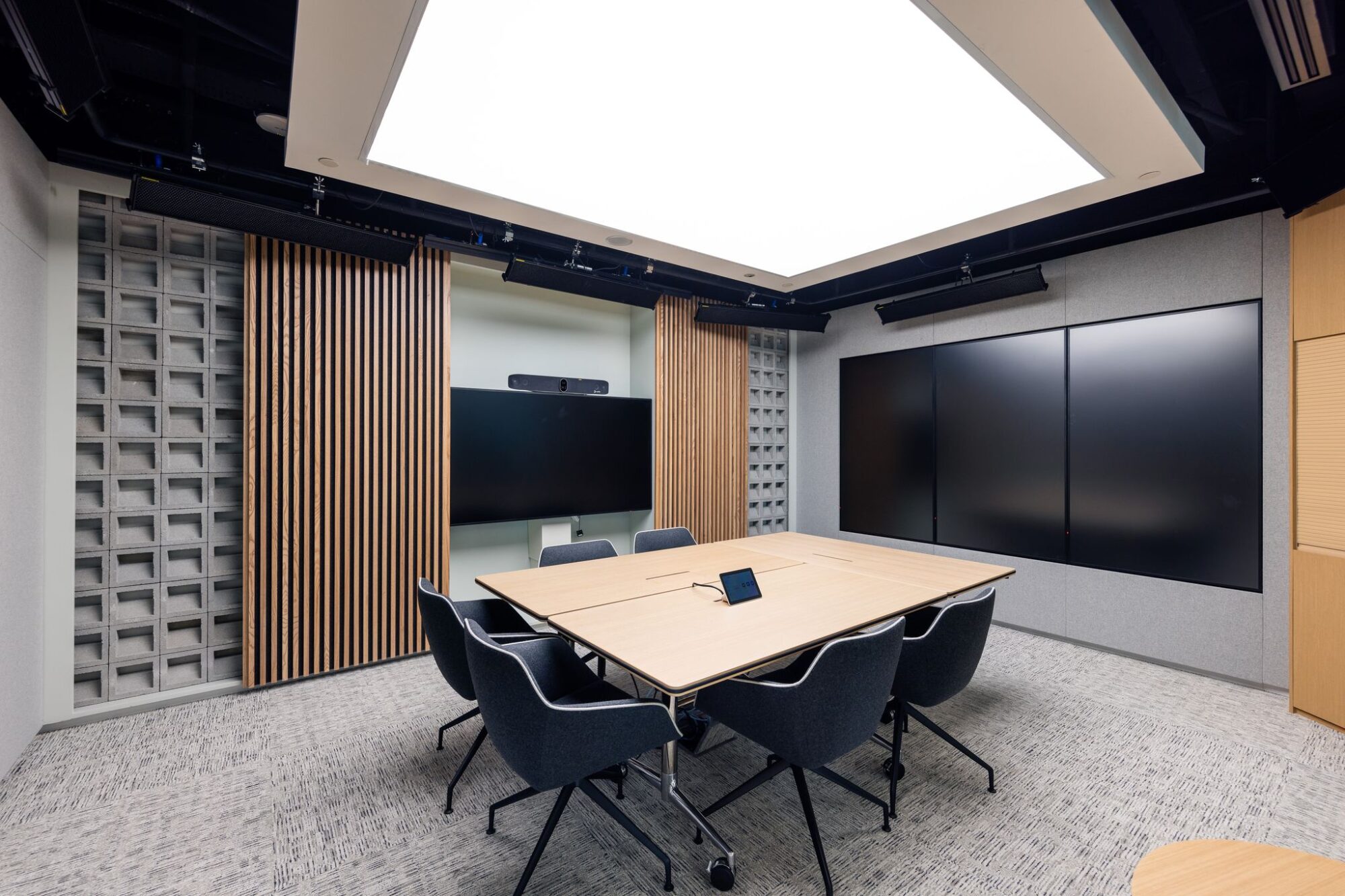Singapore Financial Services Office Expansion: LEED Platinum Sustainability and Advanced Media Infrastructure
The successful delivery of Fidelity International’s expanded Singapore office represents our expertise in managing complex financial services workspace projects that combine sustainability excellence, advanced technology infrastructure, and flexible space planning. This comprehensive project showcases our ongoing partnership with Fidelity International, demonstrating our ability to understand evolving organizational needs and deliver larger, more sophisticated workspaces that support the company’s growth trajectory in Singapore’s competitive financial services market.
The expanded office addresses Fidelity International’s operational requirements through innovative flexible workspace design incorporating moveable furniture systems and modular power infrastructure, state-of-the-art media studio with remote-control capabilities supporting global communications, comprehensive energy efficiency measures achieving 16.5% ACMV energy savings, and pursuit of LEED ID+C v4 Platinum certification—positioning this project to become Singapore’s first financial services office achieving this prestigious sustainability benchmark.
The project illustrates the critical importance of understanding financial services sector requirements, including compliance with Monetary Authority of Singapore (MAS) regulations, integration of secure technology infrastructure for sensitive financial operations, and creation of professional environments that reflect Fidelity International’s global brand standards. From initial planning through final delivery, every phase required expert coordination between specialized contractors, sustainability consultants, technology integrators, and regulatory authorities to ensure the completed workspace meets both operational requirements and ambitious sustainability objectives.
Flexible Workspace Design for Asset Management Operations
The office design prioritizes operational flexibility through innovative moveable furniture systems that enable rapid space reconfiguration responding to changing team structures and business needs. This flexibility proves essential in Singapore’s dynamic financial services sector, where regulatory changes, market conditions, and organizational restructuring frequently require workspace adaptation without the disruption and expense of traditional renovation projects.
The flexible design incorporates modular furniture kits that can be relocated by facilities teams without specialized contractors, reducing reconfiguration costs by 60-70% compared to fixed furniture installations, power and structured cabling grid system providing electrical and data connectivity throughout the floor plate, eliminating constraints of fixed workstation locations, raised floor infrastructure enabling easy cable routing and future technology upgrades, and space planning that accommodates growth from current headcount to 30% expansion capacity without major construction.
This approach to workspace flexibility reflects contemporary understanding of financial services workplace requirements, where teams expand and contract based on market conditions, project-based work demands temporary team formations, and merger and acquisition activity requires rapid integration of new personnel. The flexible infrastructure demonstrates how strategic design investments create long-term value through reduced change management costs and enhanced organizational agility in responding to business evolution.
State-of-the-Art Media Studio and Communications Infrastructure
The remote-controlled media studio represents significant investment in communications technology, addressing Fidelity International’s needs for professional-grade content creation, global team collaboration, and executive communications in an increasingly distributed work environment. The studio design incorporates broadcast-quality lighting systems with automated controls for consistent professional appearance, professional audio systems with acoustic treatment ensuring broadcast-standard sound quality, multiple high-definition cameras with remote pan-tilt-zoom capabilities, integrated teleprompter systems for scripted presentations, and sophisticated video switching and recording equipment enabling multi-camera productions.
The dual-function design enables the space to serve as both dedicated media production studio for creating marketing content, training materials, and executive communications, and as advanced video conferencing facility for high-stakes client meetings and global leadership gatherings. This versatility maximizes return on technology investment while providing Fidelity International with communications capabilities that distinguish the organization in Singapore’s competitive financial services market, where professional presentation quality influences client confidence and brand perception.
LEED Platinum Sustainability: Energy Efficiency and Environmental Leadership
The project’s pursuit of LEED ID+C v4 Platinum certification represents commitment to environmental sustainability excellence, positioning this office to potentially become Singapore’s first financial services workspace achieving this prestigious recognition. LEED v4 certification requires rigorous performance standards across multiple environmental categories, demonstrating measurable environmental benefits beyond basic regulatory compliance with Singapore’s building codes and Green Mark requirements.
Advanced ACMV Energy Performance and Efficiency Measures
The ACMV (Air Conditioning and Mechanical Ventilation) system design achieved 16.5% energy savings compared to ASHRAE baseline standards through implementation of variable refrigerant flow (VRF) systems providing zone-level temperature control and improved efficiency, demand-controlled ventilation adjusting fresh air supply based on actual occupancy levels, high-efficiency chillers and air handling units exceeding Singapore’s minimum efficiency standards, comprehensive building management system (BMS) integration enabling predictive maintenance and performance optimization, and heat recovery systems capturing waste heat for domestic hot water heating.
These energy efficiency measures deliver significant operational cost savings—reducing annual cooling costs by approximately SGD 40,000-60,000 for a typical 20,000 square foot office—while supporting Fidelity International’s corporate sustainability commitments and environmental, social, and governance (ESG) reporting requirements increasingly important to institutional investors and regulatory authorities globally.
Comprehensive Energy-Efficient Lighting Systems
Energy-efficient lighting throughout the office incorporates LED fixtures providing 40-50% energy savings compared to traditional fluorescent lighting, occupancy sensors automatically reducing lighting in unoccupied areas, daylight harvesting systems dimming artificial lighting near windows when natural light suffices, task lighting providing focused illumination where needed while reducing ambient lighting requirements, and lighting controls integrated with BMS for centralized management and performance monitoring.
The lighting strategy balances energy efficiency with occupant comfort and productivity, recognizing that lighting quality significantly impacts employee performance in financial services environments where professionals spend extended periods reviewing detailed documents and computer screens. The design achieves optimal illumination levels (500 lux at desk height) while consuming 30-40% less energy than conventional office lighting installations, demonstrating how sustainability and operational performance create synergistic value.
LEED Certification Process and Singapore Market Leadership
Pursuing LEED ID+C v4 Platinum certification required comprehensive documentation and performance verification across multiple categories including sustainable sites with alternative transportation support and reduced parking footprint, water efficiency through low-flow fixtures and water-efficient landscaping, energy and atmosphere with advanced commissioning and ongoing performance measurement, materials and resources prioritizing recycled content and regional materials, indoor environmental quality ensuring excellent air quality and thermal comfort, innovation in design demonstrating exemplary performance beyond standard requirements, and regional priority credits addressing Singapore-specific environmental challenges.
The certification process involved collaboration with USGBC-accredited LEED consultants, detailed documentation of construction materials and sources, comprehensive commissioning of all building systems, and implementation of ongoing measurement and verification protocols. Successfully achieving LEED v4 Platinum would position Fidelity International’s Singapore office among the top 2-3% of commercial interiors globally for environmental performance, demonstrating environmental leadership that aligns with the company’s institutional investment philosophy emphasizing long-term sustainable value creation.
Ongoing Partnership Excellence and Financial Services Expertise
This project represents continued collaboration with Fidelity International, building on previous successful delivery and demonstrating our deep understanding of the organization’s workplace standards, operational requirements, and corporate culture. The ongoing partnership enables more efficient project delivery through established communication protocols, familiarity with Fidelity’s approval processes and stakeholder requirements, understanding of IT and security infrastructure standards, and knowledge of global design standards applied across Fidelity’s international office portfolio.
Our expertise in financial services sector projects proves essential for navigating industry-specific requirements including secure document management systems and confidential meeting spaces, trading floor infrastructure with multiple monitors and real-time data systems, compliance with MAS guidelines for workspace security and data protection, professional aesthetic standards reflecting institutional client expectations, and business continuity planning ensuring operational resilience during construction and system cutover activities.
The strategic value of this expanded Singapore office extends beyond immediate workspace functionality to support Fidelity International’s position as a leading global asset manager. The combination of operational flexibility, advanced communications technology, and demonstrated environmental leadership creates a workplace that attracts and retains top investment professionals in Singapore’s competitive talent market, supports effective global collaboration across Fidelity’s international network, and aligns with the sustainability expectations of institutional investors who increasingly evaluate asset managers based on their own ESG practices alongside investment performance.
FAQs
What are the benefits of flexible workspace design for financial services companies in Singapore?
Flexible workspace design delivers significant value for financial services companies through rapid adaptation to organizational changes (team restructuring, regulatory adjustments) without costly renovations, cost reduction of 60-70% for space reconfigurations using moveable furniture versus fixed installations, accommodation of business cycles with expansion during market growth and contraction during downturns, support for project-based teams that form and dissolve based on client engagements, improved space utilization through hot-desking and activity-based working (reducing per-person space from 120-140 sqft to 80-100 sqft), and future-proofing against technology changes through modular infrastructure. In Singapore’s high-rent market (CBD financial services offices averaging SGD 12-15 per square foot monthly), flexibility maximizes real estate ROI by ensuring space remains optimally utilized despite business evolution. Implementation costs 15-20% premium versus traditional fitouts but delivers 200-300% ROI over 5-7 year lease terms through avoided relocation and renovation costs.
What is required to achieve LEED ID+C v4 Platinum certification in Singapore?
LEED ID+C v4 Platinum requires 80+ points across multiple categories including location and transportation (access to public transit, bicycle facilities), sustainable sites (exterior lighting control, site development), water efficiency (indoor water use reduction 40%+, water metering), energy and atmosphere (16% energy cost savings minimum, advanced commissioning, renewable energy), materials and resources (construction waste diversion 75%+, recycled and regional material content), indoor environmental quality (enhanced IAQ strategies, low-emitting materials, thermal and acoustic comfort), innovation (innovative strategies demonstrating measurable performance), and regional priority credits addressing Singapore-specific challenges. Process requires USGBC-accredited LEED consultant, comprehensive documentation of materials and systems, third-party commissioning verification, ongoing performance measurement, and certification fees (USD 6,000-12,000). Singapore-specific considerations include tropical climate adaptations, coordination with Green Mark certification, and compliance with BCA environmental standards. Timeline typically adds 3-6 months to project schedule with certification costs representing 2-3% of total project budget.
How do media studios add value to corporate office environments in Singapore?
Corporate media studios provide multiple value drivers including professional content creation for marketing, training, and internal communications at 50-70% cost savings versus external production studios, enhanced video conferencing capabilities supporting global collaboration with broadcast-quality presentation, executive communications platform enabling leadership to connect with distributed workforce and external stakeholders, recruitment tool showcasing company culture and attracting talent through professional employer branding content, and client presentation capabilities distinguishing company in competitive markets. For financial services companies like Fidelity International, professional media capabilities support thought leadership positioning, client education initiatives, and regulatory compliance through documented training programs. Implementation costs range SGD 150,000-300,000 for professional studios with broadcast-quality equipment, remote controls, and acoustic treatment. ROI analysis shows payback periods of 2-3 years through eliminated external production costs (typical rates SGD 5,000-15,000 per production day) and improved communications effectiveness driving employee engagement (15-20% improvement) and client confidence.
What ACMV energy efficiency measures are most effective in Singapore's tropical climate?
Most effective ACMV efficiency measures for Singapore include variable refrigerant flow (VRF) systems delivering 25-35% energy savings versus conventional systems through zone-level control and heat recovery, demand-controlled ventilation reducing over-ventilation and associated cooling loads by 15-20%, high-efficiency chillers with water-cooled condensers (COP 5.5-6.5 versus 3.0-4.0 for air-cooled), economizer systems using cool evening/morning air reducing mechanical cooling needs, building management systems (BMS) optimizing system performance and enabling predictive maintenance, high-performance building envelope reducing solar heat gain (U-value 1.5-2.0 W/m²K for windows), and raised floor air distribution improving ventilation efficiency. Singapore’s consistent tropical climate (26-32°C year-round, 75-85% humidity) eliminates heating requirements but demands continuous cooling representing 60-70% of building energy consumption (versus 40-50% in temperate climates). Comprehensive ACMV optimization typically achieves 15-25% energy savings (SGD 30,000-60,000 annually for 20,000 sqft office) with 3-5 year payback periods. Green Mark certification requires minimum 10% improvement over baseline, while LEED Platinum demands 16%+ savings.
How does LEED certification impact property value and tenant attraction in Singapore?
LEED certification significantly impacts Singapore commercial real estate through rental premiums of 5-10% for certified spaces versus non-certified equivalents, reduced vacancy rates with certified spaces leasing 15-20% faster, enhanced property values with 3-8% valuation premiums, lower operating costs (15-25% energy and water savings) attracting tenants focused on occupancy cost management, and competitive advantage in attracting multinational corporations with sustainability mandates. As of 2025, 85%+ of multinational financial services and technology companies require minimum LEED Gold or Green Mark Platinum for Singapore offices, making certification essential for Grade A positioning. Singapore government incentives include enhanced tax deductions for Green Mark/LEED certified buildings and preferential consideration for government tenancies. For landlords, certification investment (2-5% fitout cost premium) delivers ROI through higher rents, stronger tenant retention, and improved asset valuations. For tenants, certified spaces support corporate ESG reporting requirements, reduce operating costs, and enhance employee attraction/retention through demonstrated environmental commitment valued by 73% of Singapore professionals under age 35.
What are the biggest facility management challenges in Singapore's tropical climate?
Singapore’s primary facility management challenges include managing high humidity (75-85% year-round) and condensation requiring constant dehumidification, accelerated material degradation from intense UV exposure (UV index 11-12), continuous HVAC operation requirements consuming 60-70% of building energy, frequent maintenance needs due to 24/7 system operation, mould prevention requiring vigilant moisture control, rapid corrosion of metal components in humid conditions, and cooling tower legionella risks. These climate factors increase maintenance frequency 30-40% compared to temperate climates and demand specialised expertise in tropical building systems. Effective management requires preventive maintenance schedules (quarterly HVAC servicing versus semi-annual in temperate climates), material specifications for tropical durability (marine-grade metals, mould-resistant finishes), continuous building management system monitoring, enhanced indoor air quality programs, and higher facility management budgets (SGD 8-12 per square foot annually versus SGD 5-8 in temperate climates). Proactive tropical climate management prevents larger problems and supports long-term asset value in Singapore’s premium commercial real estate market.
How do moveable furniture systems work in modern office environments?
Moveable furniture systems enable workspace reconfiguration without construction through modular components including height-adjustable desks on casters for easy relocation, mobile storage pedestals eliminating fixed filing cabinets, freestanding screens and dividers providing privacy without permanent walls, modular meeting tables that combine or separate for various group sizes, and mobile technology carts supporting flexible equipment deployment. Critical infrastructure includes raised floor systems housing power and data cabling accessible throughout floor plate, overhead power/data distribution grids eliminating fixed power locations, wireless networks reducing cabling dependencies, and standardized furniture dimensions enabling interchangeable components. Implementation requires higher initial investment (20-30% premium versus fixed furniture) but delivers ROI through reconfiguration cost savings (SGD 50-100 per square foot for traditional renovations versus SGD 5-15 for furniture moves), reduced downtime during changes (1-2 days versus 2-4 weeks for construction), and improved space utilization adapting to changing needs. Financial services companies particularly benefit from flexibility supporting team restructuring, market-driven headcount changes, and regulatory compliance requiring physical separation of certain functions. Successful implementation requires change management supporting activity-based working culture and clear space allocation policies preventing territorial behavior.
What workplace features are most important for attracting financial services talent in Singapore?
Singapore financial services professionals prioritize workplace features including premium CBD location with excellent public transport access (70% consider location very important), modern technology infrastructure with multiple monitors and seamless connectivity, professional aesthetic reflecting institutional standards and company prestige, flexible work settings supporting focused work and collaboration, quality amenities including premium pantry facilities and end-of-trip facilities for cyclists, sustainability credentials with Green Mark or LEED certification, wellness features including ergonomic furniture and indoor air quality, professional development spaces for training and knowledge sharing, and advanced video collaboration supporting work-from-home integration. Singapore’s competitive financial services market (unemployment consistently below 2.5%) makes workplace quality critical differentiator—65% of professionals under 35 rate office quality as important job selection factor. Companies investing in Grade A spaces with comprehensive amenities experience 20-30% lower voluntary turnover and 15-25% faster recruitment for key positions. Optimal workplace investment ranges SGD 250-400 per square foot for financial services fitouts, delivering ROI through talent attraction, productivity improvements (15-20% in well-designed spaces), and reduced turnover costs (replacement costs equal 150-200% of annual salary). Leading firms view workplace as strategic tool supporting talent strategy rather than simply cost center requiring minimization.



